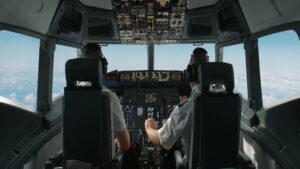Driving a car requires CNH (National Driver’s License), but when the ‘vehicle’ takes off, does the plane pilot also need this type of wallet? In the world of aviationthe rules are different: pilots do not use CNH, but need specific documents to operate aircraft legally.
Whether for recreational or commercial flights, Brazilian law requires licenses issued by ANAC (National Civil Aviation Agency), as well as medical certificates and qualifications for each type of aircraft.
But, after all, what are the mandatory documents? How to get them? And what happens if a pilot fly without proper authorization?
Next, we explain all about the pilot licenses, who supervises the skies of Brazil and what are the consequences for those who fail to comply with the standards. Get ready to take off on this theme and find out why, in the air, bureaucracy is as strict as in asphalt.
What do you need to know
Plane pilot needs CNH? Find out which required documents in aviation
Unlike drivers, who depend on CNH, aircraft pilots need a pilot license issued by Anac.
(Image: raofastockbr / shutterstock.com)
In addition, other documents are required, depending on the type of flight and the aircraft. Check out the main ones in the following content.
1. Pilot license (CMA – Aeronautical Medical Certificate)
The pilot license is the main document and is equivalent to CNH in the aviation world. It is divided into different categories, according to the purpose and type of aircraft:
- PPA (Private Plane Pilot): allows unpaid flights on monomotor aircraft;
- PCA (Commercial Plane Pilot): enables the pilot to work in civil aviation, carrying passengers or cargo;
- PLA (Airline Pilot): necessary to command large aircraft on airlines;
- Helicopter pilot (PPH, PCH, PLH): versions for helicopters of the above licenses.
Who issues is Anac, after completing the course in a homologated civil aviation school.
The emission time may take weeks or months, depending on bureaucracy and medical examinations. Upon completion of the course, do you need to carry the document whenever you conduct an aircraft? Yes, the pilot must have the license and the CMA (Aeronautical Medical Certificate) during the flight.
2. Aeronautical Medical Certificate (CMA)
Just as CNH requires medical examinations, the pilot needs a CMA, issued by an Anac -accredited doctor. He evaluates the physical and mental conditions of the candidate.
CMA Types:
- Class 1: for commercial and airline pilots (more rigorous requirements);
- Class 2: for private pilots.
Validity ranges from 6 months to 2 years, depending on age and category.
3. Housing in the aircraft
In addition to the license, the pilot must be qualified for the specific aircraft model he wants to drive. This requires additional training and practical assessments.
4. Aircraft documentation
Just as a car needs licensing, the aircraft should have:
- Aeronavability Certificate (issued by ANAC).
- Flight manual and other technical documents.
Learn more by clicking here.
What happens if it pilots an aircraft without the right license?
Piloting an aircraft without the required documentation is a crime, according to the Brazilian Aeronautics Code (Law No. 7.565/1986). But who regulates and oversees the pilots?
- ANAC regulates licenses and standards.
- Federal Police and FAB (Brazilian Air Force) may intercept aircraft in flight or soil.
- Decea (Airspace Control Department) monitors flights and can identify irregularities.
And how does inspection work, is there a blitz in the sky? Not exactly as in traffic, but there are inspections at airports and tracks. FAB may intercept suspicious aircraft, especially in restricted areas or close to large cities.
Read more:
What are the consequences for those who ride irregularly?
Riding aircraft irregularly-and this directly fits driving without proper document-or unlinted aircraft entails several consequences.
(Image: Blake Guidry / Unsplash)
Sanctions may be administrative, civil and criminal, including fines, suspension or cancellation of the license, and even lawsuits for damage to third parties or danger crimes.
Detailed consequences of irregular flights:
- Administrative Sanctions (ANAC): The National Civil Aviation Agency may apply fines, suspend or revoke pilot licenses and ban aircraft. Additionally, ANAC may take the case to the Public Prosecution Service, the Federal Police and other competent bodies;
- Civil Sanctions: The pilot may be held responsible for material or personal damages arising from accidents caused by irregular flights;
- Criminal sanctions:
- Danger crime (art. 261 of the Penal Code): putting aircraft at risk or civil aviation safety is a crime;
- Crime of disobedience (art. 330 of the Penal Code): disobey the orders of the aeronautical authority is a crime;
- Other Crimes: Depending on the occurrence, other criminal laws may be applied, such as in cases of air trafficking by air;
- Inspection and complaints: ANAC investigates complaints and may make inspections at aircraft and companies under suspicion. In the event of irregularity, the aircraft may be banned and the license of the pilot suspended or revoked.
Private Pilot (PPA): R $ 25,000 to R $ 40,000*
Commercial Pilot (PCA): R $ 50,000 to R $ 80,000*
Airline Pilot (ATPL): R $ 120,000 to R $ 200,000*
*Values vary according to school, type of aircraft and flight hours required. Includes theoretical, practical and rates (doctor, Anac, etc.).











